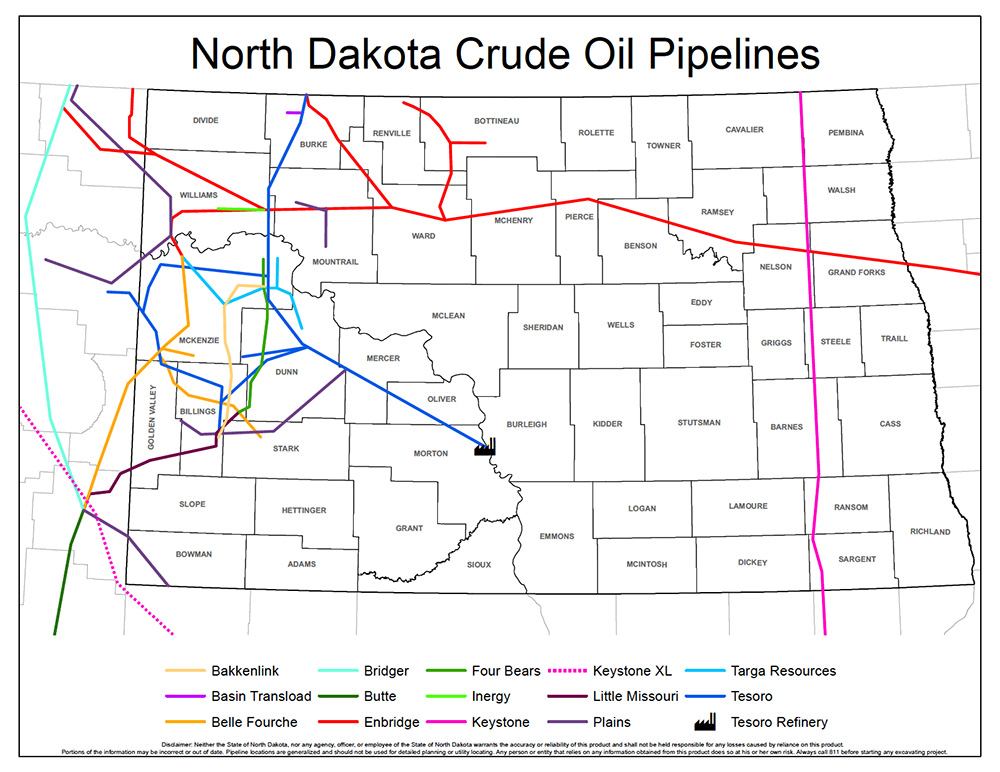Navigating the Energy Flow: Understanding North Dakota’s Oil and Natural Gas Transportation Landscape

The Williston Basin, spanning parts of North Dakota, Montana, Saskatchewan, and Manitoba, stands as a significant oil-producing region in North America. Supporting the transportation of crude oil and natural gas from wells to refineries and various destinations, an extensive pipeline network has been established within the area.
This pipeline infrastructure within the Williston Basin comprises a complex network connecting production sites to processing facilities, storage tanks, and major pipeline hubs:
- The Bakken, a pivotal pipeline system, facilitates the transportation of crude oil from the Bakken Formation in North Dakota to Illinois. Comprising the Dakota Access Pipeline from North Dakota to Illinois and the Energy Transfer Crude Oil Pipeline from Illinois to Texas.
- The Tesoro High Plains Pipeline System serves to transport crude oil from the Williston Basin to refineries in the Rocky Mountain region. It encompasses multiple pipelines stretching from North Dakota to Wyoming and Colorado.
- The Enbridge Pipeline System plays a crucial role in transporting crude oil from the Western Canadian Sedimentary Basin, including the Williston Basin, to refineries in the United States and Canada. It features the Enbridge Mainline from Alberta to Wisconsin and the Enbridge North Dakota System from North Dakota to Saskatchewan.
- The ONEOK Bakken pipeline facilitates the transit of natural gas liquids from the Williston Basin to processing facilities in Montana and Wyoming. This system comprises several pipelines spanning from North Dakota to Wyoming.
Energy Transfer
Energy Transfer stands as one of the premier pipeline operators in North America, managing numerous pipelines within the Williston Basin, notably the Dakota Access Pipeline and the Energy Transfer Crude Oil Pipeline:
The Bakken Pipeline System comprises the Dakota Access Pipeline (DAPL) and the Energy Transfer Crude Oil Pipeline (ETCO). DAPL, stretching 1,172 miles, efficiently transports crude oil from the Bakken oil fields in North Dakota to Patoka, Illinois. ETCO, spanning 700 miles, facilitates the movement of crude oil from Patoka, Illinois to Nederland, Texas.
Situated in Dunn County, North Dakota, the Little Missouri natural gas processing plant boasts a processing capacity of 200 million cubic feet per day. This facility plays a vital role in processing natural gas extracted from the Bakken shale.
In 2020, the Bakken Pipeline System conveyed an average of 531,000 barrels per day of crude oil, while the Little Missouri natural gas processing plant processed an average of 117 million cubic feet per day of natural gas during the same period.
This extensive pipeline infrastructure industry faces numerous challenges that can impact the efficiency, safety, and environmental impact. Addressing these challenges requires collaboration among government agencies, industry stakeholders, and local communities to develop and implement policies and practices that prioritize safety, environmental protection, and sustainability in oil transportation. Investing in research and development of new technologies and infrastructure solutions can also help to mitigate risks and improve the resilience of crude oil and natural gas transportation infrastructure in the face of evolving challenges.
13 thoughts on “Navigating the Energy Flow: Understanding North Dakota’s Oil and Natural Gas Transportation Landscape”